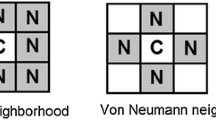Abstract
We study a model aimed to describe political views within two-dimensional approach, known as the Nolan chart or the political compass, which distinguish between opinions related to economic and personal freedom. We conduct Monte Carlo simulations and show that in the lack of noise, i.e. at social temperature \(T=0\), the consensus is impossible if there is a coupling between opinions related to economic and personal freedom. Moreover, for \(T>0\) we show how the strength of the coupling between these opinions can hamper or facilitate the consensus.
Supported by the National Science Center (NCN, Poland) through Grant No. 2016/21/B/HS6/01256.
Access this chapter
Tax calculation will be finalised at checkout
Purchases are for personal use only
Similar content being viewed by others
References
Albanese, F., Tessone, C.J., Semeshenko, V., Balenzuela, P.: Data-driven model for mass media influence in electoral context, pp. 3–9 (2019). arXiv:1909.10554v2
Alós-Ferrer, C., Granić, T.G.: Political space representations with approval data. Electoral Stud. 39, 56–71 (2015)
Axelrod, R.: The dissemination of culture: a model with local convergence and global polarization. J. Conf. Resolut. 41(2), 203–226 (1997)
Bahr, D., Passerini, E.: Statistical mechanics of opinion formation and collective behavior: micro-sociology. J. Math. Sociol. 23(1), 1–27 (1998)
Ball, P.: The physical modelling of society: a historical perspective. Physica A Stat. Mech. Appl. 314(1–4), 1–14 (2002)
Bianchi, F., Squazzoni, F.: Agent-based models in sociology. Wiley Interdisc. Rev. Comput. Stat. 7(4), 284–306 (2015)
Ditzian, R., Banavar, J., Grest, G., Kadanoff, L.: Phase diagram for the Ashkin-Teller model in three dimensions. Phys. Rev. B 22(5), 2542–2553 (1980)
Eysenck, H.: The Psychology of Politics. Routledge, London (1998)
Fisher, M., Selke, W.: Infinitely many commensurate phases in a simple using model. Phys. Rev. Lett. 44(23), 1502–1505 (1980)
Galam, S.: Sociophysics: A Physicist’s Modeling of Psycho-Political Phenomena. Springer, Heidelberg (2012). https://doi.org/10.1007/978-1-4614-2032-3
Grabisch, M., Rusinowska, A.: A survey on nonstrategic models of opinion dynamics. Games 11(4), 1–28 (2020)
Jackson, J., Rand, D., Lewis, K., Norton, M., Gray, K.: Agent-based modeling: a guide for social psychologists. Social Psychol. Pers. Sci. 8(4), 387–395 (2017)
Kononovicius, A.: Empirical analysis and agent-based modeling of the Lithuanian parliamentary elections. Complexity 2017 (2017)
Noorazar, Hossein: recent advances in opinion propagation dynamics: a 2020 survey. Eur. Phys. J. Plus 135(6), 1–20 (2020). https://doi.org/10.1140/epjp/s13360-020-00541-2
Proskurnikov, A., Tempo, R.: A tutorial on modeling and analysis of dynamic social networks. Part i. Ann. Rev. Control 43, 65–79 (2017)
Proskurnikov, A., Tempo, R.: A tutorial on modeling and analysis of dynamic social networks. Part ii. Ann. Rev. Control 45, 166–190 (2018)
Qiu, L., Phang, R.: Agent-based modeling in political decision making. In: Thompson, W.R. (ed.) Oxford Research Encyclopedia, Politics. Oxford University Press, USA (2020)
Sobkowicz, P.: Whither now, opinion modelers? Front. Phys. 8 (2020)
Stauffer, D.: Better being third than second in a search for a majority opinion. Adv. Complex Syst. 05(01), 97–100 (2002)
Sznajd, J.: From modeling of political opinion formation to two-spin statistical physics model. J. Stat. Mech. Theory Exp. 2021(1), 013210 (2021)
Sznajd-Weron, K., Sznajd, J.: Who is left, who is right? Physica A Stat. Mech. Appl. 351(2–4), 593–604 (2005)
Sznajd-Weron, K., Sznajd, J., Weron, T.: A review on the Sznajd model–20 years after. Physica A Stat. Mech. Appl. 565, 125537 (2021)
Wu, F.Y.: The Potts model. Rev. Mod. Phys. 54(1), 253–268 (1982)
Author information
Authors and Affiliations
Corresponding author
Editor information
Editors and Affiliations
Rights and permissions
Copyright information
© 2021 Springer Nature Switzerland AG
About this paper
Cite this paper
Gołȩbiowska, M., Sznajd-Weron, K. (2021). The Evolution of Political Views Within the Model with Two Binary Opinions. In: Paszynski, M., Kranzlmüller, D., Krzhizhanovskaya, V.V., Dongarra, J.J., Sloot, P.M. (eds) Computational Science – ICCS 2021. ICCS 2021. Lecture Notes in Computer Science(), vol 12744. Springer, Cham. https://doi.org/10.1007/978-3-030-77967-2_25
Download citation
DOI: https://doi.org/10.1007/978-3-030-77967-2_25
Published:
Publisher Name: Springer, Cham
Print ISBN: 978-3-030-77966-5
Online ISBN: 978-3-030-77967-2
eBook Packages: Computer ScienceComputer Science (R0)




